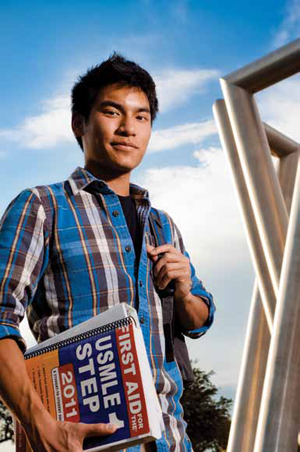Campus News
Uncommon People/David Pham: Devoted to primary care
Health sciences grad David Pham is this year’s recipient of the prestigious Sutter Maternity & Surgery Center Central California Alliance for Health Primary Care Physician Award.

When David Pham was a child, his mother told him a bedtime story about white knights who rode through human bloodstreams, fighting infections and other monsters.
“These special knights, dubbed the White Blood Cells, would protect the ill from invaders,” Pham recalled years later. “Growing up, I admired these little defenders of the weak for their selflessness.”
Pham, a recent UCSC health sciences graduate, is closer to his dream of helping those knights. He is this year’s recipient of the prestigious Sutter Maternity & Surgery Center Central California Alliance for Health Primary Care Physician Award.
Since 2007, Palo Alto Medical Foundation affiliate Sutter Maternity & Surgery Center in Santa Cruz and the Central California Alliance for Health have awarded this scholarship to pay $10,000 toward the medical school fees of a UCSC health sciences graduate who wants to return to his or her local community to help underserved populations.
Pham, 22, is now attending med school at the University of Texas Health Science Center at San Antonio, where he is interested in studying pediatrics and is committed to nutrition.
“A lot of what we see in medicine currently is the ‘last minute’ kind of medicine—using our advanced techniques to save people’s lives because of long-term degradation,” Pham said. “Early education is so important, especially when it comes to children.”
He worked as an intern for a local Santa Cruz family doctor, and served on a medical mission to Honduras. Pham also volunteered at an East Palo Alto charter school’s healthy eating program and as a Spanish translator at the Watsonville RotaCare community clinic.
Dr. Larry deGhetaldi, CEO of Sutter Health’s Santa Cruz Area health care services, praised Pham’s combination of “head and heart. Our board met with him, and all of us picked up on that positive energy.”
He also said awards that encourage students to go into primary care are a matter of urgency. “I believe that half of the newly trained physician workforce should go into primary care. The future of high-quality affordable health care depends on it, but only 10 percent of medical school graduates end up in primary care.”
Primary care doctors are extremely important because “they look at the whole picture. Primary care physicians tend to be like David—very people oriented. They are generalists who deal with the total body and total social picture, culture perspectives, and biases.”
Pham’s father emigrated from Vietnam to the United States in 1975, right after the fall of Saigon, while his mother arrived from that country in 1978, after living for three years under the Communist regime.
His parents, who met in Wisconsin and now live in Milpitas, Calif., did not push their son to follow a medical career.
“I think their main goal was just to raise the children in a peaceful environment and instill strong values in them,” said Pham.
Pham has realized, through experience, that doctors must be able to communicate in a compassionate and concise way with patients.
This realization occurred several years ago when he was visiting a hospital and saw a residing nurse communicating poorly with an anxious, elderly patient.
“I was very upset,” he said. “At the same time, it did not discourage me from going into medicine. In fact, it strengthened my resolve.”
To that end, he has worked to refine and improve his communication skills. He said that respect and clarity are of the utmost importance.
“A tiny bit of encouragement can change a person’s outlook completely,” he said.
This article appears in the fall 2011 issue of Review magazine.